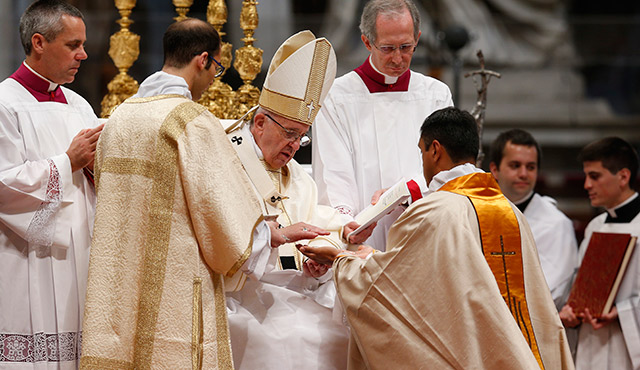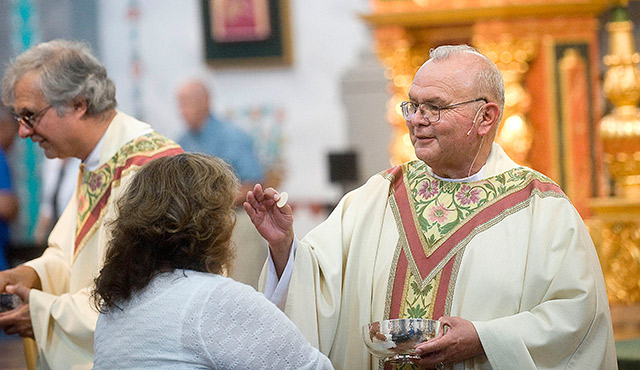We’ve all perused the greeting card section of our local retailer. We’ve giggled at the funny cards, grown teary-eyed at the heartfelt ones, shaken our heads in confusion at the goofy ones. Despite the variety, they all say the same thing.
“Thanks, Dad. We love you.”
This message comes from children, and their moms, from Hong Kong to Huntington Beach, and it happens on the third Sunday in June, which happens to be today: Father’s Day.
While almost any man can father a child, being a dad involves so much more. They serve as caregivers, protectors, financial supporters and models for healthy social and emotional behavior, among many other roles.
To devout Catholics, Father’s Day can just as easily include the celebration of two fathers: the biological and the spiritual. After all, it’s not by accident that priests are referred to as “Father.”
Why are they addressed as “Father,” anyway?
“On the spiritual side, priests are leaders of the church family, and in terms of leading community prayer, we’re people to look up to as role models,” says Fr. John Moneypenny, the Diocese’s vocations director. “We don’t have kids of our own, but in terms of the parishioners, we’re seen as the head of the family, as leaders, managers and authority figures.
Those who serve God and represent His authority must do so diligently, courageously and humbly. It’s not easy.
“You’ve heard the saying, ‘Wait until your father gets home,’” says Fr. John. “Sometimes things in the parish don’t get going until the priest shows up.”
Fathers of all kinds share many of the same tasks. Just because a man is called to serve God doesn’t mean he no longer has “earthly” responsibilities. For example, a significant part of a priest’s typical week involves helping to tend to the physical needs – such as food, clothing and housing – of the less-fortunate members of his parish. And, like dads, they frequently serve as counselors outside of the spiritual context.
An old Buddhist saying applies: “Before enlightenment – chop wood, carry water. After enlightenment – chop wood, carry water.” After a priest heeds the call and spends his life serving so many in all matters spiritual, he must still continue to “chop wood” and “carry water.” Just like all parents.
“To be a good Father, you have to be a good father,” Fr. John says. “A good father [with a wife and kids] should have many of the same positive traits as a good priest. I wouldn’t want a priest who would otherwise be a bad father. Both have to conduct themselves with a lot of integrity and character.”
Priests, however, do so much more.
Guys, do you think you’re busy? A parish priest (deep breath, all together now) celebrates daily Mass, hears confessions every week, provides marriage and prenuptial counseling, furnishes spiritual direction, anoints and visits shut-ins and the sick in hospitals and nursing homes, teaches catechism, prepares and shares sermons, baptizes, witnesses marriages, performs funeral and burial services, attends parish and diocesan meetings and attends an annual five-day retreat. This lungful doesn’t even include a priest’s own spiritual practice, which in and of itself takes a level of dedication unimaginable to most of us.
Just like fathers, priests aren’t perfect, but they carry and share an image of God the Father that far surpasses their own humanity.
Some don’t agree. They frequently point to Matthew 23:9 – “And do not call anyone on earth ‘father,’ for you have one Father, and He is in heaven.”
On the face of it, that’s a pretty good argument. However, the verse actually focuses on the sin of pride among spiritual teachers. It serves as a reminder that a good priest should never point to himself as a wise teacher; rather, they serve as dedicated conduits for the Father that is God.
“Being a priest isn’t about lording over other people,” Fr. John says. “It’s about love and respect. It’s about being a spiritual father of his parish community.”
But why can’t a spiritual father also be a husband and a dad, especially since there’s so much overlap?
“In our current Roman model, the parish and the parishioners become the family of the priest,” Fr. John says. “However, it would be very difficult for the family to come first. What must come first in a priest’s life is his parish and parishioners. All of his energy goes into this service. If a priest had his own family, the Church would come second. Being married would only add another family onto the priest’s current responsibility.”
And that’s quite a responsibility. Priests forego a great deal for the opportunity follow their calling. So today, thank your father – and your Father. They both deserve to be acknowledged for all that they do.
As Fr. John says, “Priests are the hands and feet and heart of Jesus.”


